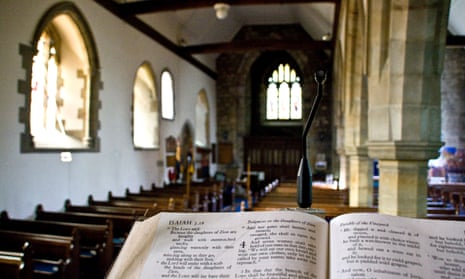The number of people attending Church of England services each week has for the first time dropped below 1 million – accounting for less than 2% of the population – with Sunday attendances falling to 760,000.
The statistics, published on Tuesday, reflect the C of E’s steady decline over recent decades in the face of growing secularism and religious diversity, and the ageing profile of its worshippers. Numbers attending church services have fallen by 12% in the past decade, to less than half the levels of the 1960s.
The figures from the church’s latest annual survey of attendance show that a weekly average of 980,000 people attended its 16,000 churches during October 2014, comprising 830,000 adults and 150,000 children. The vast majority attended on a Sunday, and there is likely to be some double-counting in the weekly figure.
Numbers shot up at Christmas, with 2.4 million attending a festive service in 2014. The church conducted 130,000 baptisms in the year, down 12% since 2004; 50,000 marriages, down 19%; and 146,000 funerals, down 29%.
The church said it was not surprised by the latest figures. “While the recent trend of the past decade continues, it has been anticipated and is being acted on radically,” said Graham James, bishop of Norwich.
“We do not expect that trend to change imminently or immediately over the next few years due to demographics. We lose approximately 1% of our churchgoers to death each year. Given the age profile of the C of E, the next few years will continue to have downward pressure as people die or become housebound and unable to attend church.”
Speaking at the opening of the Anglican primates’ meeting in Canterbury, the archbishop of Canterbury, Justin Welby, said: “In some parts of the Communion decline in numbers has been a pattern for many years. In England our numbers have been falling at about 1% every year since world war two ... The culture [is] becoming anti-Christian, whether it is on matters of sexual morality, or the care for people at the beginning or the end of life. It is easy to paint a very gloomy picture.”
The church has embarked on a radical “reform and renewal” programme intended to reverse declining numbers, partly by diverting funds away from small, struggling rural parishes to urban churches where the potential for growth is greatest.
Several urban churches have shown remarkable growth in the past year, according to the C of E. St Swithun’s in Bournemouth, a church established in 2014, now has weekly attendances of 500, and King’s Cross church in central London has grown from single figures to 500 in the past five years.
The C of E is also developing “network churches” that meet in cafes, pubs and other places outside of consecrated buildings.
The church, whose current leadership is dominated by evangelicals, recently created a new bishop, based in Islington, to focus on “church planting” – the establishment of new churches in areas of potential growth.
The church also says that attendance statistics do not take into account activities such as running food banks and C of E schools.
In the 2011 census, 59% of the population defined themselves as Christian, down from 72% in 2001. One in four people said they had no religion, up from 15% in 2001.
Keith Porteous Wood, of the National Secular Society, said: “Church of England attendance now appears to have fallen below 2% of the population, and looks set to fall further given the preponderance of older churchgoers. This seriously calls into question its right to remain the established church. Indeed, it is inappropriate for there to be any established religion in a modern pluralistic society, far less one where the majority do not consider themselves to be religious.”

Comments (…)
Sign in or create your Guardian account to join the discussion